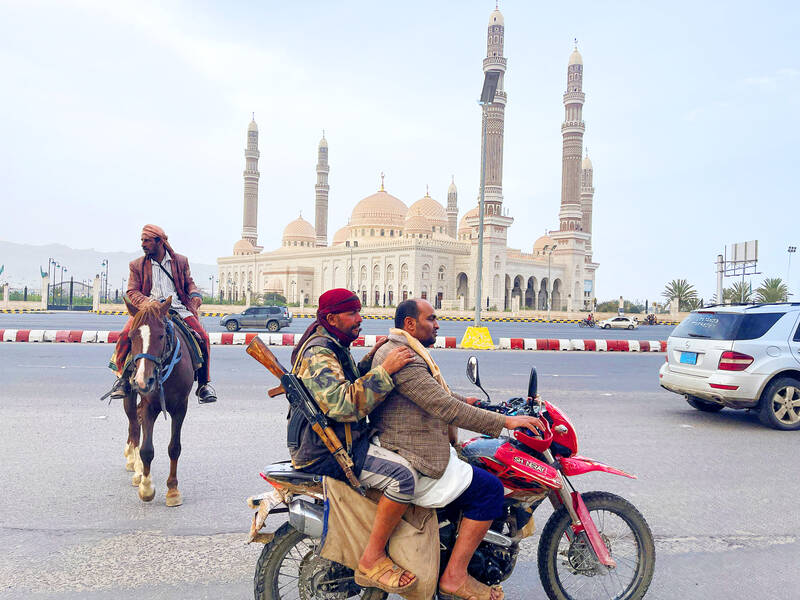Saudi Arabia’s ambassador to Yemen on Monday said that his trip to the Houthi-held capital of Sana’a was aimed at reviving a ceasefire and restarting political talks to end the nine-year conflict.
Mohammed bin Saeed al-Jaber met with Houthi officials in Sana’a on Sunday for talks also attended by Omani officials.
The trip came as talks between Saudi Arabia and the Houthis gained momentum after the kingdom reached a deal with Iran last month to restore their diplomatic ties.

Photo: Reuters
Iran is the Houthis’ main foreign backer in Yemen’s conflict.
Al-Jaber wrote on Twitter that his trip was meant to “stabilize the truce and cease-fire, support the prisoner exchange process and explore venues of dialogue between Yemeni components to reach a sustainable, comprehensive political solution in Yemen.”
His comments were the first by Saudi Arabia on the visit.
Yemen’s conflict began in 2014 when the Houthis seized Sana’a and much of Yemen’s north, ousting the internationally recognized government that fled to the south then into exile in Saudi Arabia.
The Houthi move prompted a Saudi Arabian-led coalition to intervene months later in a bid to restore the government to power.
The Saudi Arabian envoy met with Mahdi al-Mashat, head of the Houthis’ supreme political council, which runs rebel-held areas in Yemen.
Yemeni and Saudi Arabian officials said that Riyadh and the Houthis reached a draft deal last month to revive a ceasefire that expired in October last year.
The deal, brokered by Oman, is meant to usher in a return to political talks, said officials who spoke on condition of anonymity because they were not authorized to discuss closed-door negotiations.
One Yemeni official said that the phased roadmap includes lifting the Saudi Arabian-led coalition’s air and maritime blockade on Houthi-held areas, and the rebels would end their siege of Taiz, Yemen’s third-largest city.
The Houthis also accepted security guarantees for Saudi Arabia, including a buffer zone with Houthi-held areas along the Yemeni-Saudi Arabian border, the Yemeni official said.
The Yemeni government and the rebels would also work to unify the country’s central bank, and a mechanism would be established to pay salaries of state employees — including the military — from oil and gas revenues, he said.
The official said that Riyadh promised to support a widespread reconstruction efforts in Yemen where the war devastated its infrastructure and created one of the world’s worst humanitarian disasters.
Spokespeople for the Houthis and the coalition did not respond to requests for comment.
UN spokesman Stephane Dujarric on Monday hailed the talks as “a welcome step” that would help settle the conflict and de-escalate regional tensions.
“What we’re seeing is different strands, different parties that have been in tension with each other, have been speaking,” Dujarric said.
The UN was not involved in the Sana’a talks, but “we very much hope that it can contribute to the overall peace efforts led by [UN envoy for Yemen] Hans Gruenberg for the renewal of the truce in Yemen and the restart of the intra-Yemeni political process,” he said.
Yemen’s government has welcomed what it calls Saudi Arabia’s efforts to bring Yemeni parties to the negotiating table to reach a “comprehensive political agreement,” it said in a statement on Sunday.

Packed crowds in India celebrating their cricket team’s victory ended in a deadly stampede on Wednesday, with 11 mainly young fans crushed to death, the local state’s chief minister said. Joyous cricket fans had come out to celebrate and welcome home their heroes, Royal Challengers Bengaluru, after they beat Punjab Kings in a roller-coaster Indian Premier League (IPL) cricket final on Tuesday night. However, the euphoria of the vast crowds in the southern tech city of Bengaluru ended in disaster, with Indian Prime Minister Narendra calling it “absolutely heartrending.” Karnataka Chief Minister Siddaramaiah said most of the deceased are young, with 11 dead

By 2027, Denmark would relocate its foreign convicts to a prison in Kosovo under a 200-million-euro (US$228.6 million) agreement that has raised concerns among non-governmental organizations (NGOs) and residents, but which could serve as a model for the rest of the EU. The agreement, reached in 2022 and ratified by Kosovar lawmakers last year, provides for the reception of up to 300 foreign prisoners sentenced in Denmark. They must not have been convicted of terrorism or war crimes, or have a mental condition or terminal disease. Once their sentence is completed in Kosovan, they would be deported to their home country. In

Brazil, the world’s largest Roman Catholic country, saw its Catholic population decline further in 2022, while evangelical Christians and those with no religion continued to rise, census data released on Friday by the Brazilian Institute of Geography and Statistics (IBGE) showed. The census indicated that Brazil had 100.2 million Roman Catholics in 2022, accounting for 56.7 percent of the population, down from 65.1 percent or 105.4 million recorded in the 2010 census. Meanwhile, the share of evangelical Christians rose to 26.9 percent last year, up from 21.6 percent in 2010, adding 12 million followers to reach 47.4 million — the highest figure

LOST CONTACT: The mission carried payloads from Japan, the US and Taiwan’s National Central University, including a deep space radiation probe, ispace said Japanese company ispace said its uncrewed moon lander likely crashed onto the moon’s surface during its lunar touchdown attempt yesterday, marking another failure two years after its unsuccessful inaugural mission. Tokyo-based ispace had hoped to join US firms Intuitive Machines and Firefly Aerospace as companies that have accomplished commercial landings amid a global race for the moon, which includes state-run missions from China and India. A successful mission would have made ispace the first company outside the US to achieve a moon landing. Resilience, ispace’s second lunar lander, could not decelerate fast enough as it approached the moon, and the company has